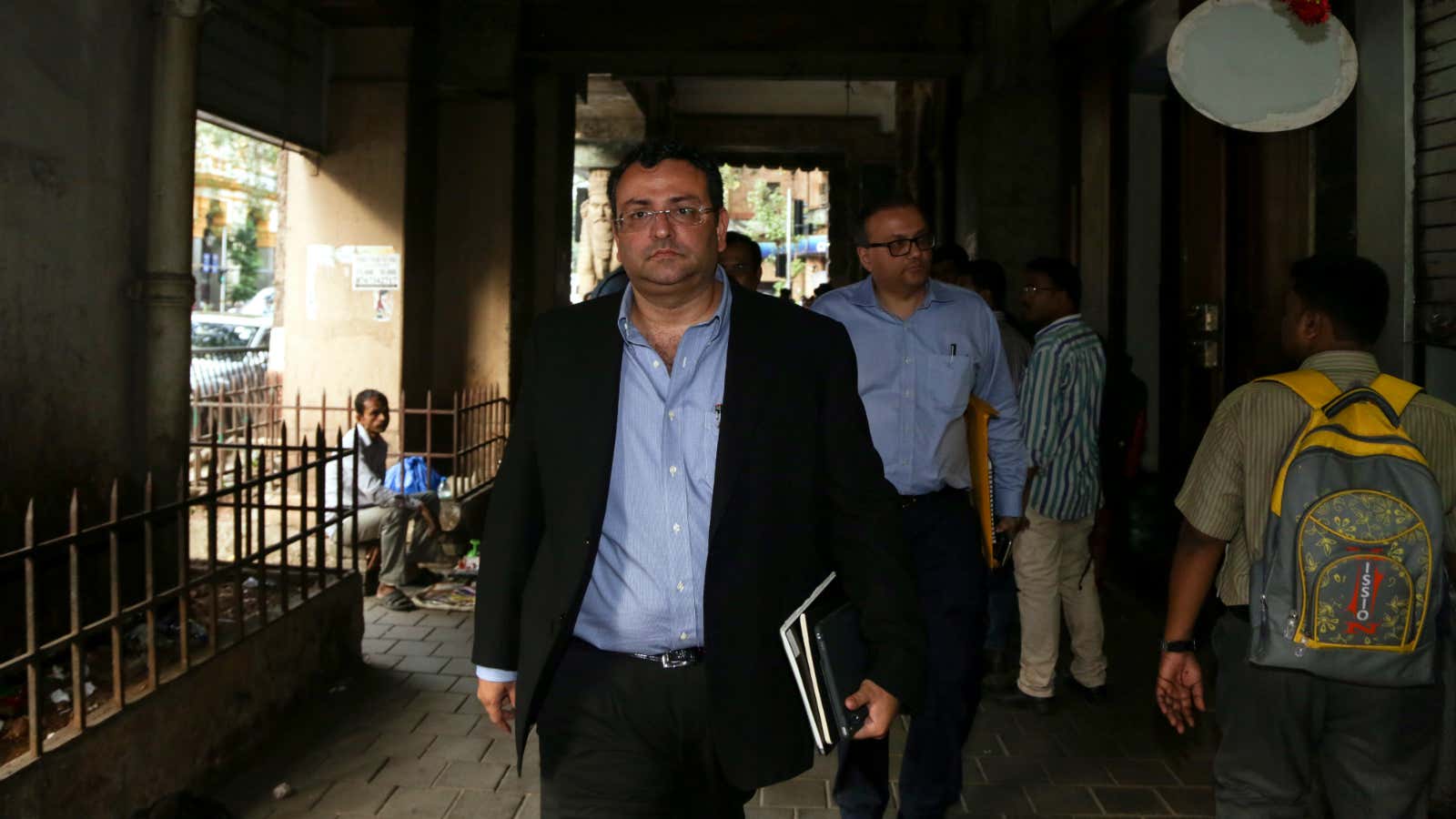Over two weeks after Cyrus Mistry was unceremoniously ousted from the Tata Group as its chairman, the $103-billion group has finally stated its reasons for such a move.
In a letter to the media (pdf), the 148-year-old Tata Group listed out numerous concerns, including the former chairman’s inability to generate adequate profits even as debt mounted, and his “devious” plan to wrest control of the group from Tata Sons, the group’s holding company.
Four days after his ouster, Mistry had come out all guns blazing at the group, questioning its corporate governance practices while also alluding to constant interference from former chairman Ratan Tata. He also claimed he was a “lame duck chairman” and that the group would have to write off $18 billion because of five unprofitable businesses.
On Nov. 10, the Tata Group finally rebutted Mistry’s arguments. The conglomerate’s letter came after the group replaced Mistry as chairman of software giant Tata Consultancy Services (TCS), too. Mistry had remained the TCS chairman even after his ouster from the group
No profits to show
The group has pointed out that under Mistry it was facing losses that had affected the dividends paid to Tata Sons.
In its letter, the group said dividends from the group companies declined from Rs1,000 crore in 2012-13 to Rs780 crore in 2015-16. Tata Consultancy Services was the only saving grace when it came to generating profits, it said.
“Thus, but for the TCS dividend and even before impairment provisions, Tata Sons would have shown operating losses over the last three years (with a small surplus in between), showing the significant dependence on TCS. This dependence was indeed a source of concern for the Directors and its shareholder,” the letter said.
Wresting control
The letter says that Mistry was “consciously” dismantling many of the group companies and reducing Tata Sons’ control and influence over them.
“Tata Sons has historically exercised control over its group companies through its shareholding and commonality of senior directors (apart from the chairman) which had acted as a binding force in the group for many years and which has enhanced the credibility and creditworthiness of the group companies,” the group said. ”We now have an unacceptable new structure where the chairman is the only common director across several companies and this situation could not be allowed to go on.”
Hurt by criticism of legacy
In his letter, Mistry had raised concerns about his helplessness over handling many of the “legacy hotspots” at the group. These included the group’s decision to launch an airline business and the Tata Nano car.
“Nobody will deny that there were some problem companies,” the group said. ”The three major problem companies are Tata Steel Europe, Tata Teleservices/Docomo, and the Indian operations of Tata Motors. The fact is that even after four years, there is no noticeable improvement in the operations of these companies, and in fact they have got worse as shown by continuing huge losses, increasing high debt levels and declining share in their respective markets.”
“There are a few other companies which are also having different problems—and are these also to be excused as ‘legacy’ issues?” the group questioned.
Badly-managed Tata Steel Europe and Docomo
The Tata Group has been trying to dispose of its steel business in Europe over the past few months without much success. In addition, it also had a public spat with its telecom partner in India, Japan’s largest phone company, NTT Docomo. Docomo had been demanding that it be paid half the amount it invested in the 26.5% stake in the partnership.
A legal battle is on and Tata Sons has already deposited $1.17 billion with the Delhi high court as an award for arbitration.
“Critical reports have been received of the handling of the Tata Steel Europe problems in the UK and the negotiations with Docomo of Japan in the respective countries,” the letter said.
Devious plans
The group has also alleged that Mistry is showing his “true colors” only after his expulsion from the group. Earlier this week, independent directors at the Tata group’s hospitality arm, Indian Hotels (IHCL), had said that it backed Mistry as chairman.
“Having been replaced as chairman of Tata Sons, where the majority of the board and the major shareholders had expressed a lack of confidence, Mr. Mistry is trying to gain control of IHCL with the support of the independent directors of the board,” the group said. “He has cleverly ensured over these years that he would be the only Tata Sons representative on the board of IHCL in order to frustrate Tata Sons’ ability to exercise influence and control on IHCL.”
The Tatas have said that they felt “betrayed” by such a move.
Why raise write down issue?
In his letter following the sacking, Mistry had alleged that the group faced a write-off of $18 billion due to the losses at various group companies.
The Tata group has now asked in its letter whether Mistry had “informed the boards of these companies at any time in the past specifically of the above mentioned potential write-downs?” adding that “surely he could not have ‘discovered’ such a large potential liability only a day or two after he was replaced as the chairman of Tata Sons. Therefore, he must have been aware of this potential large provision much earlier but did not disclose it.”
The group has also blamed Mistry’s outburst as the reason for losing over Rs25,000 crore in market value immediately after his letter was made public. “Here again, it is unfortunate that the shareholders and regulatory authorities would put the onus on the companies and not Mr. Mistry as the author of the statement for being responsible for this large loss in market value.”
